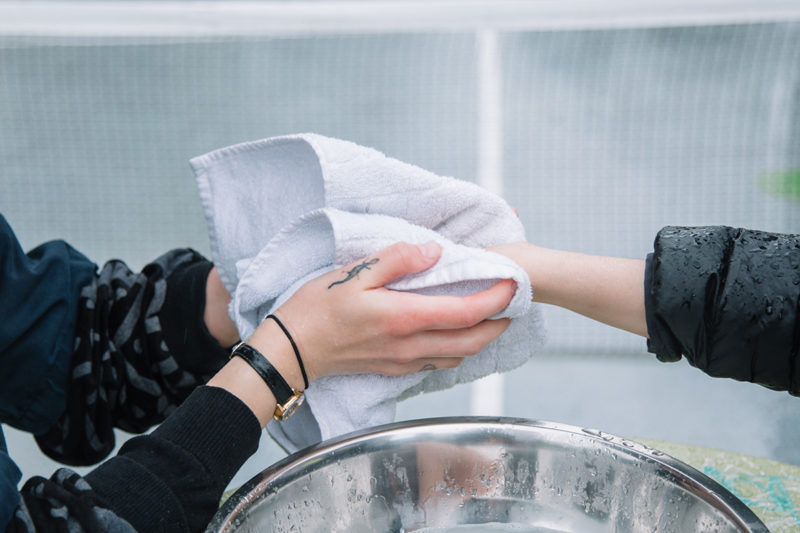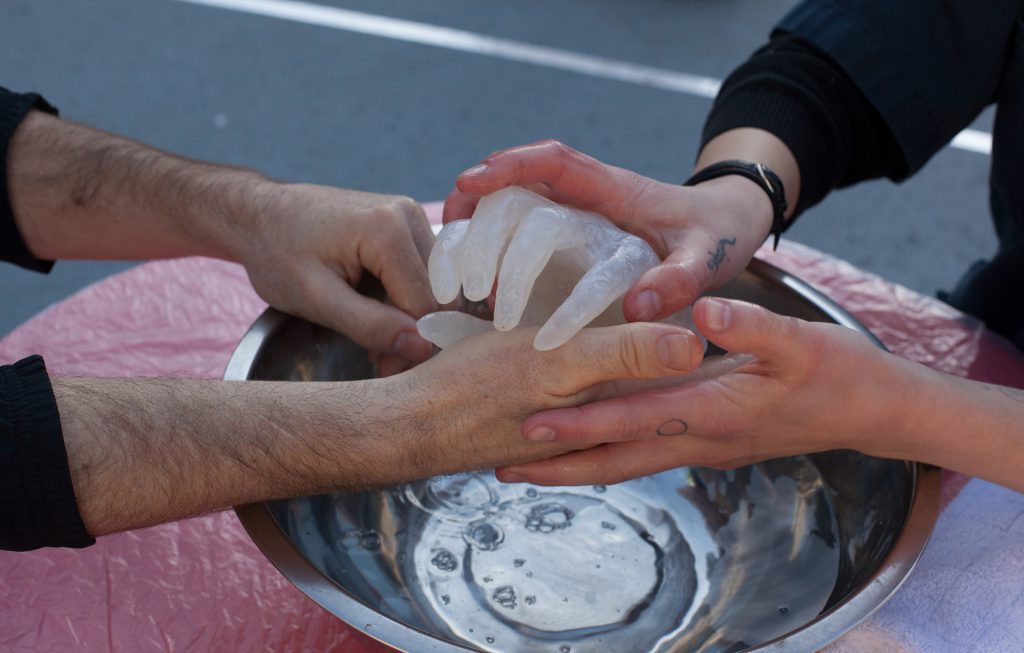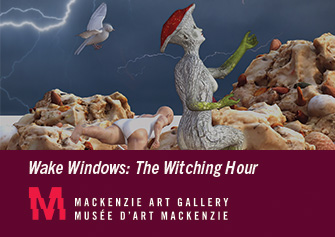An Unexpected Intimacy: Marika Vandekraats’ performance ‘Washing Hands with Soap in the Shape of my Mother’s Hands’
30 January 2019
By Ella Adkins
The impermanence of our physical bodies is a reality that humans must constantly deny. For many, the so-called “degradation” of our physical selves through processes such as aging and sickness is something to be hidden, denied by lotions and serums, or frantically ‘cured’ by pills, medicines and procedures. There is an undeniable anxiety surrounding the act of decay that is living, since it is a reminder that regardless of our spiritual human experience, we can be reduced to a mass of muscle and bone that will slowly and inevitably decompose.
This act of decay is artfully manifested in Vancouver-based artist Marika Vandekraats’ performance work, Washing Hands with Soap in the Shape of my Mother’s Hands (2018). Last spring, under a large umbrella providing partial safety from the elements in Robson Square, Vandekraats sat next to a large sign reading: “Free Hand Washing.” Those who sat down got just that: a free hand wash using soap cast in the shape of Vandekraats’ mother’s hands.
“Body has always been a main focus area in my practice”, explained Vandekraats. “Living overseas, I always had a paranoia about health. What do I do if I get sick?” Vandekraats then spoke to an experience in which this anxiety became very personal. Her mother had melanoma in her finger that went untraced for a long period of time. When she finally had an operation to remove the cancer, the surgery evoked many anxieties and thoughts that translated delicately into this work. The soap slowly degrading with each wash paralleled the stresses of the body, in particular the incremental decay of her mother’s hand.

“The soap manages to communicate this feeling and anxiety that things are going to disappear,” Vandekraats added. As the soap degraded with every hand wash, the shape of the soap also begins to degrade. So it can be said, that with each wash, each participant was witness to her mother’s hands degrading. It was the very literal and gradual process of deformation which infused the work with complexity. It wasn’t just a bar of soap disintegrating, but a bar of soap in the shape of a human hand—a hand familiar to the artist. Whilst the soap decays in the water, simultaneously, her performance documents a copy of a “human” hand decaying through its various interactions with others. The soap hand is tethered to an individual, her mother, who experienced a surgery, which removed a part of her body, an almost forced decay. Regardless of one’s personal connection to the hand, an act of decay was being manifested and demonstrated for us as spectators throughout this performance, evoking a reflection on the stability and permanence of our own bodies over time. I ask myself: what will my hand look like after bearing more years, more work, more stress?
Degradation and decay are main themes in this work, but it simultaneously has a delicacy and intimacy. For Vandekraats, the hands are representative of the feeling of her mother’s fingers through her hair: a specific gesture in their mother-daughter relationship. The familial detail articulated in the title of the work is crucial, since it allows the participant to understand the poetic ripples that it creates. Immediately, I tethered the hands to interactions with my own mother’s: the wrinkled creases of her hands that I liked to pull at when I sat in her lap. I was and still am surprised at how soft they are.

The thoughtful, hyper-specific intimacy in Vandekraats’ performance was especially magnificent since it took place in a setting that was the furthest from private. The contrast of the heavy pedestrian flow of Robson Square with the close, delicate intimacy of Vandekraats’ work challenged what kinds of relationships can exist within a public sphere. Any barriers of distance were eradicated as soon as a pedestrian chose to participate. Vandekraats created small, brief moments of human connection, that were soft and gentle in their execution, but momentous in their significance. This performance was a meditative interruption in a location of mass traffic, allowing participants to experience a brief intimacy which engaged with the very natural process of decay and degradation—the ones which make us human.
I asked Vandekraats what sort of conversation she had with her participants. She responded, “The exchange that was occurring was more personal and intimate in reception. It wasn’t so much about the conversation that occurred verbally, but more in the reception of touch.” The occurrence of such an exchange within the public sphere in many ways challenges the expectations and barriers of public performance art. Vandekraats’ work was a quiet, yet powerful intervention in a space that rejects intimacy and connection. Suddenly, the anonymous, guarded pedestrian could experience a slow, wet and soapy act of human interaction with the potential to both recall specific memory and inform us of the fragility of our human condition, all before their 12 o’clock meeting.
The performance Washing Hands with Soap in the Shape of my Mother’s Hands, 2018 by Marika Vandekraats took place on March 11 and April 28, 2018 in Robson Square, Vancouver. The performance was presented in conjunction with Open Season and Ten Different Things.
Feature Image: Detail from the performance by Marika Vandekraats in Vancouver, BC. Photo by Julia Lamare, courtesy of the artist.



